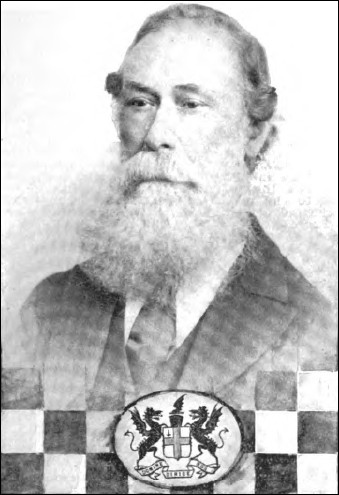zanzibar: From <ACM v2 Dec 1898 No 6 p257><AMERICAN CHESS Magazine. 257
Leaders of European Chess.
A. MOCATTA.
President of City of London Chess
Club 1894-1897.
To compile anything approaching a complete sketch of Mr. Mocatta's chess career would necessitate a resume of practically the whole of the principal events of chess in the old country during two generations, and would embrace the history of the premier club, the City of London, for many years past, and cover quite the most interesting and progressive period of that clubs career.
Mr. Motatta is connected with that distinguished Hebrew family, the Monteflore's, who occupy an honored place among the philanthropists of the world, and of recent years have become more widely known through the munificence of the late Sir Moses Monteflore. Mr. Mocatta's parents died when he was very young, and he was brought up by his uncle, Moses Monteflore, by whom he was taught chess, and soon attained a degree of proficiency that enabled him, when 13 years of age, to defeat his uncle. As a young man he enjoyed exceptional opportunities for improving his play. His uncle being a keen chess enthusiast, frequently entertained the prominent chess players of the day, including staunton, Capt. Evans, Zukertort, Steinitz, Gossip and others.
Mr. Mocattas first club was the Westminster, which was frequented by these masters and by all the best London players, and he recalls with keen pleasure many tough encounters over the board with these champions; and more particularly is he
proud of his achievement in the Westminster club tournament, when he tied with Steinitz for first prize, but was defeated in playing on the deciding game. He attributes much of his proficiency in chess to his numerous games with Buckle (author of the History of Civilization), who in his day was considered one of the finest amateur players.
Mr. Mocatta is also a whist player, and often played in partnership with another keen chessist, then Mr. Charles Russell, now Lord Russell of Killowen, Lord Chief Justice and president of the Metropolitan Chess Club. After the dissolution of the Westminster Club Mr. Mocatta became a member of the City of London Chess Club, of which he has been one of the main pillars ever since, not only on account of his playing strength, which has always been maintained up to first class standard, but also in the other "essentials" which are constantly needed to keep together a strong organization, and take a leading part in chess movements from time to time. In all these matters Mr. Mocatta has been ever ready, without ostentation, to lend the most generous assistance.
On many occasions he was urged to accept the presidency of the club, but with characteristic modesty he preferred the role of quiet worker. Finally, however, the members would take no denial, and he was installed with acclamation, despite his disinclination to come into prominence. At the time he assumed the presidency, the City Club was, perhaps, at the "zero of its fortunes," but he had the supreme satisfaction (before handing over the presidential chair to Sir George Newnes this year) of seeing the club, under his guiding hand, become the most powerful chess organization in Great Britain, or even the world.
Mr. Mocatta was one of the selected competitors for the amateur championship at Hastings in 1895. He was suffering somewhat from a cold at the time, and having formed a very high opinion of the play of one of the amateur visitors, he offered to stand aside if the gentleman in question were allowed to take his place. The committee consented, and so Maroczy, for that was his name, came out as a new chess luminary. Thus Mr. Moratta laughingly claims that he was responsible for the discovery of a new chess genius. This episode is typical of Mr. Mocatta's generosity in all matters, and it is as matter of universal regret among the chess players of the metropolis, that, with advancing years, he is not able to come among them so frequently as of yore, but his enthusiasm for chess has not dimmed, and he may recently have been frequently seen at the Ladies club, whose aims and progressiveness commands his warmest sympathy, playing a match at Knight odds with the Hon. Secretary Mrs. Bowles.
Mr. Mocattas family are all chess players. and especially to himself and an invalid daughter, to whom he is devoted, the royal game of chess affords the happiest of pastimes. During one of the family chess parties, Miss Moratta was playing her brother, when a little toddling nephew, thinking Auntle was getting the worst of it, stealthily appropriated her opponents queen, and ran off with it, exclaiming, "Now, Father, you cannot checkmate Auntie, for your king is a widower." Mr. Mocatta is proud of this little grandson, and thinks that chess in the family is safe for many generations yet.
>







